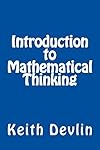

Cliquer sur une vignette pour aller sur Google Books.
|
Chargement... Introduction to Mathematical Thinkingpar Keith Devlin
 Aucun Actuellement, il n'y a pas de discussions au sujet de ce livre.   ) )Keith Devlin’s book “Introduction to mathematical thinking.” is the textbook, the unnecessary and ridiculously inexpensive ($10) textbook, for his class on Coursera.com. The class obviously designed to be an introduction to mathematical thinking, a transition from the problem solving math of secondary school to college level mathematics where simply finding an answer is not the final goal. I wanted to take a look at the free, non-credit classes that Coursera offers and this looked like a good one to try. It has been 30 years since I last took college calculus, and I have not looked at a math book since then. I knew I could do the work, I wanted to see just how a free, non-credit class, with 50,000 students worked. Both the class and the book are excellent. Devlin begins by showing us that imprecision is often acceptable in spoken English. “One American dies every hour from heart disease” is his favorite example. Literally it says that there is one single American who dies, and apparently recovers, from heart disease every hour. We all understand the true meaning because in English we have background knowledge which allows us to make sense from nonsense based on the context. Mathematics requires precision because with it we will be dealing with concepts with which we do not have the background to guide our understanding. Dr. Devlin focused on developing logical thinking and managed to arrange the lessons and exercises such that the mathematical logic required quickly evolves from simple “and” “or” statements into doing formal proofs, no small feat for a class only seven weeks long. The book was not really necessary for the class, the video lectures were very close to the text and the problem sets could be printed out and worked on offline but I do feel that having the book helped me. I find it impossible to highlight a point in a video lecture. I was concerned about how a class this large could be taught, in all the math classes I have taken the learning takes place not during the lecture but answering questions that come up after attempting to work problems related to the lecture. Advanced students were recruited to act as Teaching Assistants to keep an eye on the discussion threads and answer questions when they could. Threads that had heavy traffic were brought to professor Devlin’s attention and he, most often, just confirmed what the TA’s had said. Learning directly from the book is possible but would mean losing what for me was the most helpful part of the class, the forums. I learned a lot taking the class, principally that you can forget a lot in thirty years. I was over a week behind in the work and struggling not to fall farther behind when it came time for the final exam. Needless to say I will not be getting a certificate of completion. I also learned several other things, Coursera classes really are college level, someone only a few years out of high school would have had to work to finish the class and would have been prepared for higher mathematics classes and would be better able to think logically. It was expected that out of the over 50,000 students that started the class as few as 5,000 would successfully finish it but as Dr. Devlin pointed out, teaching 5,000 students in traditional classes of 25 students would represent one professor’s entire career. This one class introductory level class freed up one career to teach higher level classes. aucune critique | ajouter une critique
"Mathematical thinking is not the same as 'doing math'--unless you are a professional mathematician. For most people, 'doing math' means the application of procedures and symbolic manipulations. Mathematical thinking, in contrast, is what the name reflects, a way of thinking about things in the world that humans have developed over three thousand years. It does not have to be about mathematics at all, which means that many people can benefit from learning this powerful way of thinking, not just mathematicians and scientists."--Back cover. Aucune description trouvée dans une bibliothèque |
Discussion en coursAucun
 Google Books — Chargement... Google Books — Chargement...GenresClassification décimale de Melvil (CDD)510.1Natural sciences and mathematics Mathematics General Mathematics Philosophy And PsychologyClassification de la Bibliothèque du CongrèsÉvaluationMoyenne: (3.75) (3.75)
Est-ce vous ?Devenez un(e) auteur LibraryThing. |
||||||||||||||||||||||||||||||||||||||||||||||||||||||||||||||||||||||||||||||||||||||||||||||||||||||||||||||||||||||||